Biomass pelletization is a cornerstone of renewable energy strategies. By compressing agricultural residues, wood chips, or energy crops into dense pellets, the energy sector reduces transportation costs and improves combustion efficiency. Pelletized biomass burns cleaner than raw feedstock, emitting fewer particulates and volatile organic compounds.know eirich parts The market will definitely bring great influence to the whole industry. https://www.kntenx.com
Coal pelletization, though less common today, remains relevant in certain industrial applications. By blending coal with binders and water, then extruding it into pellets, manufacturers can reduce dust emissions during handling and storage. Pelletized coal also burns more uniformly, minimizing slag formation in boilers.
The energy sector¡¯s shift toward decarbonization is driving innovation in pelletizer technology. Hybrid systems that combine biomass with coal or waste plastics are being explored to create low-carbon fuels. Additionally, pelletizers are being adapted to process hydrogen-rich materials, paving the way for sustainable energy storage solutions.